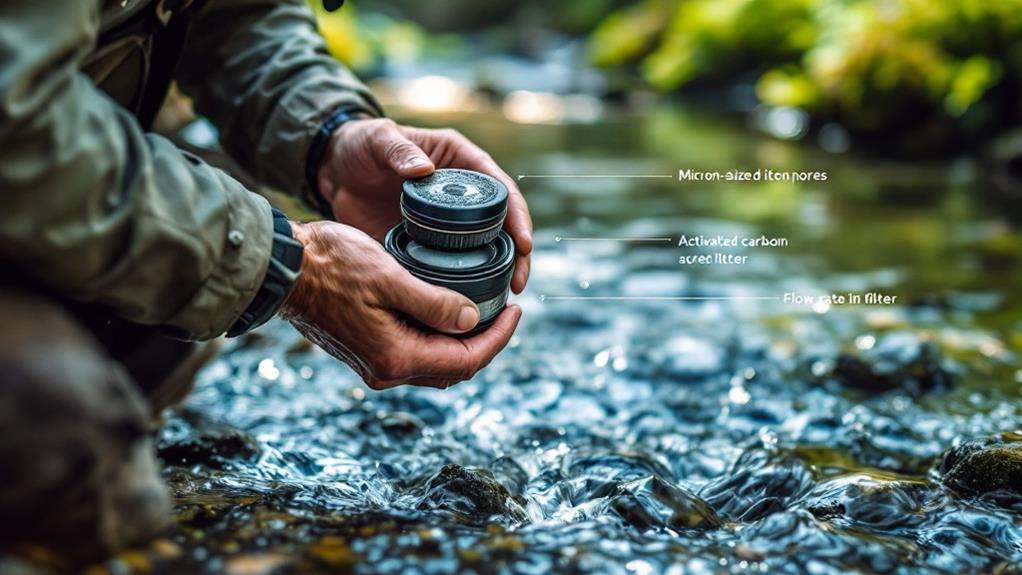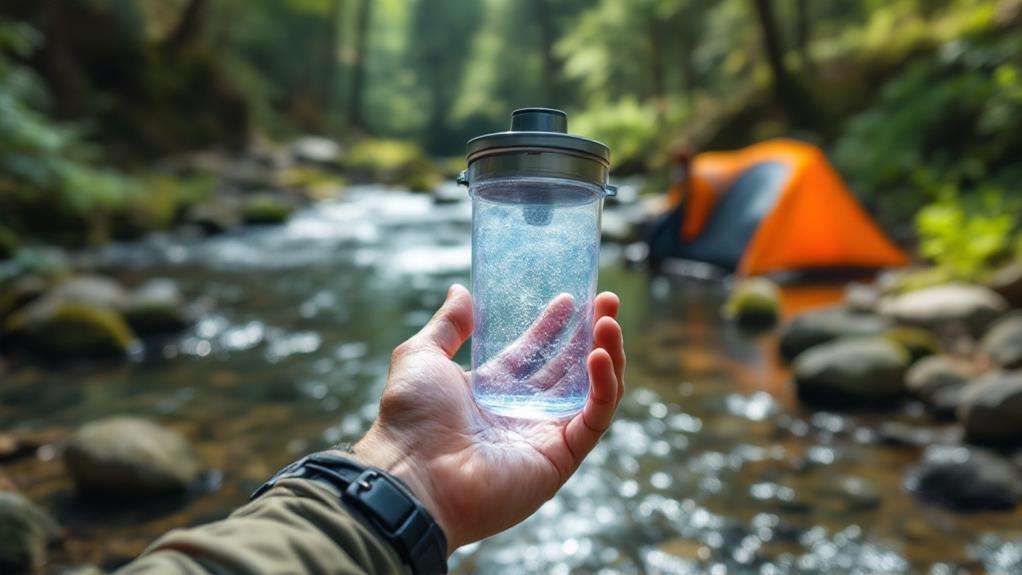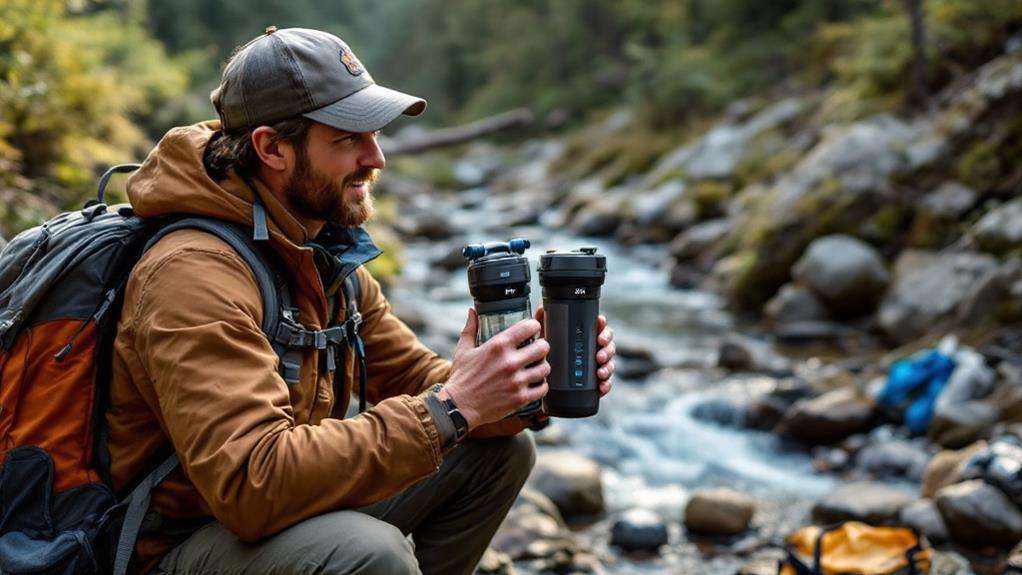How to Choose a Portable Water Filter for Camping and Travel
To choose a portable water filter for camping and travel, consider your specific needs and the water sources you'll encounter. Look for filters that remove bacteria and protozoa, with purifiers offering additional protection against viruses. Evaluate the filter's mechanism, pore size, and flow rate. Factor in weight, size, and ease of use for your activities. Don't forget to assess long-term costs, including replacement cartridges. Prioritize filters meeting EPA/NSF standards for safety. Balance portability with functionality, ensuring your chosen filter can handle the volume you need. By understanding these key factors, you'll be better equipped to select the ideal water filter for your excursions.
Understanding Water Filter Types
When it comes to portable water filters, understanding the different types is crucial for choosing the right one for your needs. The main distinction lies between filters and purifiers. Filters physically remove protozoa and bacteria by trapping them in microscopic pores, while purifiers use chemical or UV light treatment to kill viruses, protozoa, and bacteria.
You'll encounter various filtration methods, each with its own advantages. Pump filters offer precise water volume control, while gravity filters provide hands-free operation. If you're looking for a lightweight and compact option, squeeze filters might be your best bet. Many filters incorporate activated carbon to reduce unpleasant tastes and some chemical contaminants.
For added protection, consider a purifier. UV light purifiers kill microorganisms without requiring filter replacement, but they need clear water and a power source. Chemical purification using chlorine or iodine is effective against most pathogens, though it may affect taste and requires longer contact times.
To extend your filter's lifespan, look for models with a prefilter to remove larger particles before they reach the main filtration system. By understanding these options, you'll be better equipped to choose the right water treatment solution for your outdoor expeditions.
Assessing Your Specific Needs
The key to selecting the perfect portable water filter lies in a thorough evaluation of your specific needs. Begin by considering the microorganisms present in your travel destination, as different filters and purifiers have varying capabilities in removing bacteria, protozoa, and viruses. This will help you choose the right level of water purification for your trip.
Next, estimate your daily water consumption and select a portable water filter with a capacity that matches your usage. Don't forget to factor in the device's weight, size, and ease of use to confirm it fits your backpacking or travel requirements.
Assess whether you need additional features like chemical treatment, UV light, or activated carbon to address specific water quality concerns. These extra capabilities can be essential depending on your destination's water conditions.
Lastly, consider the long-term costs associated with your chosen water purification system. Factor in expenses for replacement cartridges or batteries to get a comprehensive view of your investment. By carefully evaluating these aspects, you'll be able to choose a portable water filter that perfectly suits your needs and guarantees safe, clean drinking water throughout your journey.
Key Features to Consider

Portable water filter selection hinges on several key features that can make or break your outdoor experience. When choosing a water filter, consider the type of filter mechanism, as it affects speed, ease of use, and volume capacity. Pump, squeeze, and gravity filters each have their pros and cons, so select one that suits your needs.
Pore size is critical for effective filtration. Look for filters with 0.1-0.2 micron pores to remove protozoa and bacteria. If you're concerned about viruses, you'll need purifiers with even smaller pores. Don't forget about activated carbon filters, which improve taste by reducing odors and chemicals, though they won't remove microorganisms.
Prefilters are essential for extending your filter's life and effectiveness, especially in turbid waters. Consider the filter's weight, size, and durability, as these factors impact your carrying capacity and the filter's longevity in rugged conditions. Remember, a well-chosen water filter can be the difference between a great outdoor expedition and a miserable experience. By carefully evaluating these key features, you'll be better equipped to select the right portable water filter for your camping and travel needs.
Effectiveness Against Microorganisms
Understanding the effectiveness of portable water filters against microorganisms is essential for your safety in the wilderness. When choosing a water filtration system, it's imperative to know the difference between filters and purifiers. Filters can remove protozoa and bacteria, but they may not eliminate viruses due to their smaller size. If you're traveling to areas with a risk of viral contamination, you'll want to opt for a water purifier instead.
Water purifiers are designed to remove, kill, or inactivate all types of disease-causing microorganisms, including bacteria, viruses, and protozoan cysts. To ensure you're getting a reliable product, look for purifiers that meet the EPA Guide Standard Protocol or the NSF P231 standard. These rigorous testing protocols simulate worst-case scenarios and provide a high level of confidence in the purifier's effectiveness.
If you're mainly concerned about bacteria and protozoa, a filter with hollow fiber membranes (0.1 or 0.2 micron pore size) can be sufficient. However, for comprehensive protection, especially in areas with unknown water quality, a purifier is your best bet. Always consider the specific risks of your destination when selecting your water treatment method.
Ease of Use and Maintenance

While effectiveness is indispensable, ease of use and maintenance play essential roles in choosing the right portable water filter for your outdoor expeditions. Different types of filters offer varying levels of convenience and upkeep requirements.
Pump filters, despite requiring manual effort, are generally easy to use and maintain. They often feature field-cleanable elements, allowing you to extend their lifespan during your trip. Gravity filters provide hands-free operation and large volume capacity, but you'll need to factor in additional setup time.
For those prioritizing portability and ease of use, consider these options:
- Squeeze filters: Small, lightweight, and convenient
- Bottle filters: Fill-and-sip experience with replaceable elements
- UV light purifiers: Easy to use with no element replacement
When evaluating ease of use, consider the filter's flow rate and how quickly it can process water. Field upkeep is another key factor; some filters require regular backflushing or element cleaning to maintain supreme performance.
Remember that each filter type has its trade-offs. Bottle filters offer convenience but have smaller volumes, while UV purifiers are easy to use but require battery power. Choose the filter that best balances your needs for ease of use, maintenance, and effectiveness in your outdoor escapades.
Weight and Portability Factors
Beyond ease of use, weight and portability are key considerations when selecting a water filter for your outdoor expeditions. When backpacking or camping, every ounce matters, so choosing a lightweight, portable filter is vital to minimize your pack weight.
Ultralight filters like the Sawyer Squeeze are ideal for hikers and trekkers, weighing in at a mere 2 oz. These compact options allow you to carry less weight without compromising on water safety. If you're planning longer trips or need to filter water for a group, gravity filters such as the Platypus GravityWorks offer high-volume treatment with a 4-liter capacity. However, they're heavier at 15 oz, which may impact your overall pack weight.
Pump filters like the MSR MiniWorks EX strike a balance between weight and functionality, weighing 1 lb. They're more compact than gravity filters but require manual effort to operate. For those prioritizing convenience, water purifier bottles like the Katadyn BeFree weigh 1.5 lbs and offer a portable solution with a 1-liter capacity. Consider your specific needs and trip duration when choosing between these options to find the best balance of weight, portability, and functionality for your outdoor journeys.
Cost and Long-Term Value

The price tag on a water filter can be deceiving. While you might be tempted to opt for the cheapest option, it's paramount to contemplate the long-term value and total cost of ownership. Water filters can range from $20 for basic models to over $100 for high-end gravity filters, but the initial cost doesn't tell the whole story.
When evaluating a water filter's true cost, consider these factors:
- Frequency of replacement filter purchases
- Cost of replacement filters
- Filter lifespan
- Volume of water filtered per cartridge
Gravity filters often have a higher upfront cost but can be more cost-effective in the long run. They typically require less frequent filter replacements and offer hands-free operation, making them ideal for group camping trips. On the other hand, pump filters may have a lower initial price but might need more frequent filter changes, potentially increasing long-term costs.
Don't forget to factor in the filter's durability and performance. A more expensive water filter that consistently provides clean, safe water and lasts longer may ultimately offer better value than a cheaper alternative that needs frequent replacements or fails to remove all contaminants effectively.
